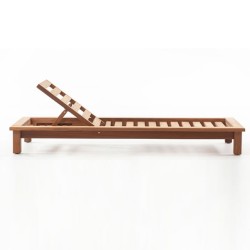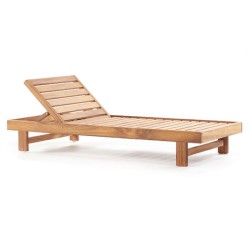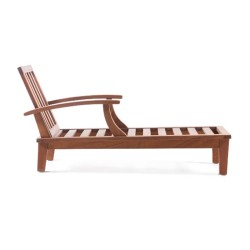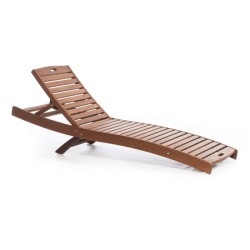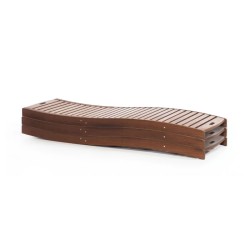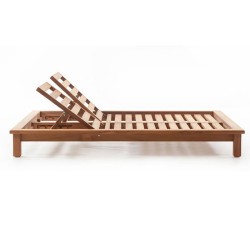Sunbed
Sunbed
Sunbed: Comparison of Plastic, Wood (Iroko, Teak) and Aluminum
Sun loungers adorn the poolsides of luxury hotels and glamorous beaches. In addition, it is also found in the gardens and balconies of the houses. The material options of this relaxing and comfortable furniture are of very high quality. Their uses vary between plastic, wood (iroko, teak) and aluminum. These materials can affect the durability, maintenance and overall aesthetics of lounge chairs.
Sunbed All Features
Plastic Sunbeds
Plastic sun loungers are popular because they are often the most economical option. These types of sun loungers are generally preferred because they are light and easy to carry. In terms of durability, a quality plastic lounge chair can withstand the weather and resist cracking or fading even in the extreme heat of the sun or freezing winter conditions. However, the environmental impact of plastic loungers is a concern for sustainability, as plastic materials are generally insoluble in nature.
Wooden Sunbeds: Iroko and Teak
Wooden chaise lounges offer a natural aesthetic and generally display a more premium and luxurious appearance. Iroko and teak wood are particularly popular choices for wooden lounge chairs.
The iroko tree is a durable wood species from Africa and is often used in shipping. This indicates that the iroko wood is resistant to water and humid weather conditions. Iroko sun loungers are generally preferred because of their rich colors and durable structure.
Teak wood is native to South and Southeast Asia and is widely used in nautical and outdoor furniture. Teak wood is highly resistant to abrasion, rot, insect infestations and weathering because it has natural oils.
Both types of wood are aesthetically appealing, but they require maintenance. Wooden lounge chairs can often fade over time and have cracks in their surface, requiring regular maintenance and possibly re-polishing.
Aluminum Sunbeds
Aluminum sun loungers attract attention due to their lightness and durability. In terms of strength, aluminum is a weatherproof metal and highly resistant to corrosion, which means aluminum lounge chairs will last a long time. Also, aluminum lounge chairs often offer a modern and minimalist aesthetic. However, metal's tendency to conduct heat means that aluminum lounge chairs can get very hot in the sun.
Factors and Maintenance Tips in Choosing a Sunbed
Which lounge chair material you choose will depend on a number of factors. These factors often relate to your budget, the style of your space, climatic conditions, and your sustainability preferences.
Budget is the most important factor for most buyers. Plastic loungers are usually the most affordable, but in some cases being cheaper can affect their quality and durability. Wooden and aluminum lounge chairs are generally more expensive, but they can last longer and generally have a more luxurious feel.
The style of the space also plays an important role in the selection of sun loungers. Plastic lounge chairs are often colorful and vibrant, so they can be a good choice for a more youthful and energetic atmosphere. Wooden lounge chairs offer a natural and traditional look, making them the perfect choice for spaces with a classic or rustic style. Aluminum lounge chairs often offer a modern and minimalist look, making them an ideal choice for contemporary or industrial style spaces.
Climatic conditions also play a large role in material selection. In humid and rainy areas, wooden loungers need regular maintenance and protection to prevent them from rotting. In sunny and hot areas, plastic loungers are fading and cracking. Aluminum sun loungers, on the other hand, heat up and cause discomfort to the user.
When it comes to maintenance, plastic lounge chairs are usually cleaned with a simple soap and water mixture. Wooden loungers need regular oiling and polishing to prevent cracks and fading. Aluminum lounge chairs are usually cleaned with a mild detergent and water mixture, but it's important to avoid abrasive cleaners.
Sunbeds: Comparison of Plastic, Wood (Iroko, Teak) and Aluminum
While sun loungers adorn the poolsides of luxury hotels and glamorous beaches, they are also found in the gardens and balconies of the houses. The material options for this relaxing and comfortable furniture often range from plastic, wood (iroko, teak) and aluminum. These materials affect the durability, maintenance and overall aesthetics of sun loungers.
Plastic Sunbeds
Plastic sun loungers are popular because they are often the most economical option. These types of sun loungers are generally preferred because they are light and easy to carry. In terms of durability, a quality plastic lounge chair withstands the weather. Resists cracking or fading even in extreme sun or freezing winter conditionswidth is shown. However, the environmental impact of plastic loungers is a concern for sustainability, as plastic materials generally do not biodegrade.
Wooden Sunbeds: Iroko and Teak
Wooden chaise lounges offer a natural aesthetic and generally display a more premium and luxurious appearance. Iroko and teak wood are particularly popular choices for wooden lounge chairs.
The iroko tree is a durable wood species from Africa and is often used in shipping. This indicates that the iroko wood is resistant to water and humid weather conditions. Iroko sun loungers are generally preferred because of their rich colors and durable structure.
Teak wood is native to South and Southeast Asia and is widely used in nautical and outdoor furniture. Teak wood is highly resistant to abrasion, rot, insect infestations and weathering because it has natural oils.
Both types of wood are aesthetically appealing, but they require maintenance. Wooden sun loungers usually fade over time and cracks appear on their surfaces. This requires regular maintenance and possibly re-polishing.
Aluminum Sunbeds
This stylish aluminum lounge chair attracts attention due to its lightness and durability. This comfortable aluminum is a weatherproof metal and highly resistant to corrosion which means aluminum lounge chairs will last a long time. Also, aluminum lounge chairs often offer a modern and minimalist aesthetic. However, metal's tendency to conduct heat means that aluminum lounge chairs can get very hot in the sun.
Which lounge chair material you choose will depend on a number of factors. These factors often relate to your budget, the style of your space, climatic conditions, and your sustainability preferences.
Budget is the most important factor for most buyers. Plastic loungers are usually the most affordable, but in some cases being cheaper affects their quality and durability. Wooden and aluminum sun loungers are generally more expensive. It lasts longer and generally feels more luxurious.
The style of the space also plays an important role in the selection of sun loungers. Plastic lounge chairs are often colorful and vibrant, so they can be a good choice for a more youthful and energetic atmosphere. Wooden sun loungers offer a natural and traditional look. This makes them the perfect choice for spaces with a classic or rustic style. Aluminum sun loungers generally offer a modern and minimalist look. This makes them an ideal choice for contemporary or industrial style spaces.
Climatic conditions also play a large role in material selection. In humid and rainy areas, wooden loungers need regular maintenance and protection to prevent them from rotting. In sunny and hot regions, plastic loungers wither and crack. Aluminum sun loungers, on the other hand, get hot and cause discomfort to the user.
When it comes to maintenance, plastic lounge chairs are usually cleaned with a simple soap and water mixture. Wooden loungers need regular oiling and polishing to prevent cracks and fading. Aluminum sun loungers are usually very easy to clean with a mild detergent and water mixture. But it's worth noting to avoid abrasive cleaners.
